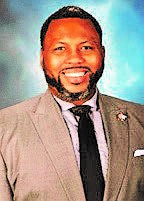STATE REPRESENTATIVE’S DISTRICT IS RACIALLY AND SOCIOECONOMICALLY DIVERSE
Kam Buckner is a Illinois State Representative for the 26th District, which encompasses South Chicago to Streeterville. Photo provided by Kam Buckner
Illinois State Representative Kam Buckner represents the 26th District, which encompasses South Chicago, South Shore, Woodlawn, Greater Grand Crossing, Bronzeville, Hyde Park and all the way up to Streeterville and the Gold Coast. It is one of the most racially and socioeconomically diverse districts in the state of Illinois.
Buckner grew up in Roseland and is a product of the Chicago Public School system. He worked in politics, and went to the University of Illinois Urbana-Champaign where he received his undergraduate degree. He’s also a graduate of DePaul University where he received his Juris Doctor degree.
“For the last two and a half years, I’ve been the State Representative for the 26th District and its been [t]he job of a lifetime for me,” Buckner said.
As a young man growing up in Chicago, Buckner saw the reverence his parents and grandmother had for the late Mayor Harold Washington.
“Seeing my grandmother talk about him with such bellowing pride, it really made me start thinking about what politics was and who politicians were and how they added to the fabric of our society,” he said. “The more I learned and the more I read up and studied on public service, it really pushed me in that direction.”
Buckner added, his parents taught him and his siblings that “public service is the rent you pay to live on earth.” He said it manifests itself in different ways, depending on what a person’s passion is. He said he always knew he would be working in public service, but he did not know it would be in politics, but he is happy that it is.
Buckner said the neighborhoods he represents have nuanced and diverse neighborhoods, all in the city of Chicago. Each neighborhood is distinct in its own right, although they are 6 miles apart. One distinction is life expectancy between those neighborhoods.
“Washington Park has a life expectancy that is 18 ½ years lower than Streeterville. These are two neighborhoods in the same city, two neighborhoods in the same state rep. district. So, it’s up to me to continue to find ways to stand up and to highlight and to strengthen places like Streeterville and River North, but to also make sure places like Washington Park and Bronzeville and Greater Grand Crossing have the opportunities to live the quality of life that their neighbors do to the North of them,” he said.
Buckner worked in New Orleans for former Mayor Mitch Landrieu. He said Chicago and New Orleans have a lot in common. They’re both tribal, neighborhood driven cities. He said Chicago people have felt like neighborhoods have been disinvested or haven’t received help or resources needed.
“We walk around with a certain swagger about ourselves because it’s forced us to be self-reliant and self-sufficient. People in New Orleans have a similar aura about themselves. And, you can’t blame them when you look at footage from August 2005, when there were thousands of our brothers and sisters on top of the roofs of their homes, waiting for help from local and federal government to come save them from a disaster that we knew was coming. So, I think that really engenders a certain kind of toughness when it comes to city certain politics,” he said.
Buckner added, there is something special about community driven politics in Chicago and New Orleans. He said Washington, DC politics is more top down.
Buckner, who is the chair of the Illinois House Black Caucus, said he is extremely proud of the work done by the Illinois Legislative Black Caucus to pass the bills that were meant to end systemic racism. He said it will really show the rest of the country what can be done. He talked about George Floyd, Rekia Boyd and Laquan McDonald.
“The question always was, how do we go from protest to progress. How do we take these very unfortunate and egregious incidents and turn them into actionable change for our people. And, my colleagues and I, in the Illinois Legislative Black Caucus, were able to do that. And, it’s really a testament to the hard work of each member of the Caucus and us really taking an opportunity to make sure that the work that we’re doing is mirroring what our communities need,” he said.
“We, for a long time, have been told, laws like the ones that we passed, were too provocative, they were too progressive, they were too radical and that we should wait our turn and wait for things to get better. And, we noticed things weren’t going to change by osmosis. That we actually had to put the work in,” he said. “What we also know is that the Calvary is not coming. The people who are going to save Chicago, save Illinois, are already here. What we have to do is give voice to these folks and give these folks the resources they need.”
Latest Stories
- Rep. Evans Celebrates Launch of Chicago State University Football Program and Vision for the Future
- Comcast Awards Project SYNCERE with $15,000 Grant to Support STEM Education for Students in Chicago
- CPD TO ESCORT FOUR HUGE REINDEER TOW TRUCKS FULL OF TOYS AND ELECTRONICS TO SEVEN-YEAR-OLD BOY WHO RECENTLY LOST HIS MOTHER TO VIOLENCE
- OVER 700 CONFIRMED SOUTHLAND KIDS TO LINE UP EARLY FOR POPULAR CHICAGO AREA-BASED CHRISTMAS GIFT GIVEAWAY
- Stitch Fix Unveils the Top Trends of Women’s Fashion in 2025 and the Style Shift to Watch for in 2026
Latest Podcast
Wendy Thompson-Friend Health

